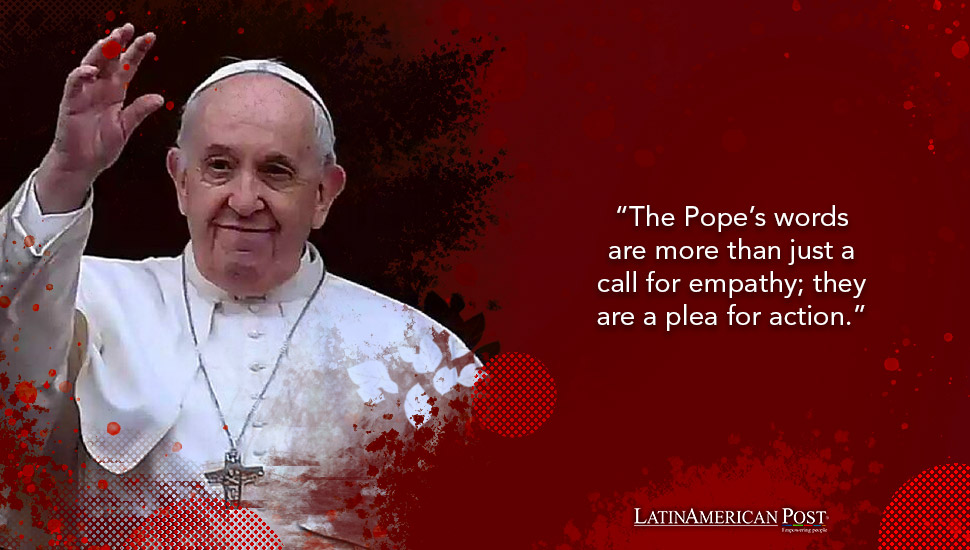Argentinian Pope’s Call to Action: Addressing the Global Mpox Crisis

Argentina’s Pope Francis has urged governments and pharmaceutical companies to provide adequate medical assistance for mpox patients worldwide. His call to action resonates particularly in Latin America, where healthcare disparities and infectious disease outbreaks have long posed significant challenges.
Argentina’s Pope Francis, known for his deep compassion and commitment to the well-being of all people, recently spoke out about the growing threat of mpox (formerly known as monkeypox). During his Sunday Angelus address, the Pope expressed solidarity with the thousands suffering from this infectious disease. He urged governments and private industries to ensure adequate medical care is available to everyone, regardless of their geographic location or economic status. His message resonates strongly, particularly in regions like Latin America, where the intersection of poverty, inequality, and healthcare challenges exacerbates the impact of global health crises.
The Pope’s words are more than just a call for empathy; they are a plea for action. The mpox outbreak, now recognized as a global health emergency by the World Health Organization (WHO), has already claimed over 21,500 cases and 591 lives in Africa alone since January 1. Yet, this crisis is not confined to one continent. It threatens global public health, requiring a united and coordinated international response.
Latin America’s Healthcare Struggles
The Pope’s call for equitable healthcare rings particularly true in Latin America. The region has long been plagued by healthcare disparities, with millions lacking access to even the most basic medical services. In countries like Venezuela and Haiti, healthcare systems are in a state of near collapse, with shortages of medicines, medical supplies, and trained healthcare professionals. Even in more developed nations like Brazil and Argentina, the public healthcare system struggles to meet the needs of its population, particularly in rural and underserved areas.
During the COVID-19 pandemic, Latin America bore the brunt of the virus, experiencing some of the highest infection and death rates in the world. The region’s fragile healthcare systems were overwhelmed, leading to a catastrophic loss of life and exposing deep-seated inequalities in access to medical care. The lessons learned from that crisis are still fresh, yet the current mpox outbreak threatens to push these already strained systems to the brink again.
The Need for Solidarity and Shared Responsibility
Pope Francis’ call for solidarity is not just a moral imperative but a practical necessity. The mpox outbreak, like COVID-19, does not respect borders. In an interconnected world, the health of one population is intrinsically linked to the health of others. If we fail to act decisively and equitably, we risk allowing mpox to become another pandemic that disproportionately affects the most vulnerable.
The Pope’s message to governments and private industries to “share technology and treatments” is crucial in this fight. The development and distribution of vaccines and antiviral treatments must be prioritized, focusing on making them accessible to all, particularly in low- and middle-income countries. This is not just a matter of charity; it is a matter of global security. As we saw with COVID-19, the unequal distribution of vaccines and treatments prolongs the pandemic and allows the virus to continue spreading and evolving.
With its history of infectious disease outbreaks, Latin America knows all too well the consequences of delayed or inadequate responses. The region has faced numerous public health crises over the years, from the Zika virus to dengue fever, often with insufficient international support. The current mpox outbreak presents an opportunity to do things differently and act with the urgency and unity that the situation demands.
Private Sector’s Role
The Pope’s call also challenges the private sector, particularly pharmaceutical companies, to put the public good above profit. This is a radical but necessary demand in a world where a country’s wealth often determines access to life-saving treatments. The pharmaceutical industry wields enormous power in deciding who gets access to the treatments and vaccines that can prevent or mitigate diseases like mpox. In Latin America, where economic disparities are stark, the cost of medicines often puts them out of reach for the most vulnerable populations.
The private sector has a moral and ethical responsibility to ensure that life-saving treatments are accessible to all, not just those who can afford them. This means reducing the price of vaccines and medicines, sharing technology and patents, and working with governments to distribute these resources where they are needed most. It also means investing in the research and development of treatments specifically designed to meet the needs of low- and middle-income countries, where diseases like mpox are more likely to spread unchecked.
The Call to Lead by Example
Latin American countries have a unique opportunity to lead by example in responding to the mpox crisis. Governments in the region must prioritize public health and take decisive action to prevent the spread of the disease. This includes investing in healthcare infrastructure, increasing access to vaccines and treatments, and ensuring the most vulnerable populations are not left behind.
In Argentina, Pope Francis’ homeland, the government is responsible for heeding his call. Argentina has a robust public healthcare system compared to its neighbors, but underfunding and regional disparities in access to care still plague it. By leading in the global response to mpox, Argentina can set a powerful example for the rest of the region and the world.
Brazil, the largest and most populous country in Latin America, also has a critical role to play. The government has a strong tradition of public health initiatives, including its world-renowned HIV/AIDS programs. However, Brazil faces significant challenges, including political instability and a deeply divided society. The government must rise above these challenges and take decisive action to protect its citizens from the growing threat of mpox.
The Moral Imperative: Health as a Human Right
At the heart of Pope Francis’ message is the belief that health is a fundamental human right. This principle is enshrined in international law and is a core tenet of Catholic social teaching. Yet, in practice, access to healthcare is often treated as a privilege reserved for those who can afford it.
The mpox outbreak is a stark reminder of the inequalities in our global healthcare system. The fact that people in some parts of the world are more likely to suffer and die from this disease simply because of where they were born is a grave injustice. It is incumbent upon all of us, as individuals, communities, and nations, to work towards a world where everyone can access the care they need.
With its substantial social justice and human rights tradition, Latin America is well-positioned to lead this fight. The region has a long history of advocating for the rights of the poor and marginalized, and this tradition must guide its response to the mpox crisis. By ensuring that everyone, regardless of their economic status or geographic location, has access to life-saving treatments, Latin America can help to build a more just and equitable world.
Answering the Pope’s Call
Pope Francis has issued a clarion call for action in the face of the global mpox crisis. His words resonate deeply, particularly in Latin America, where the impact of health disparities is felt most acutely. But this is not just a call for governments and industries but for all of us to recognize our shared responsibility in addressing this crisis.
The lessons of the COVID-19 pandemic are still fresh in our minds. We know that inaction, inequality, and a lack of solidarity can have devastating consequences. The mpox outbreak allows us to do things differently and respond with compassion, urgency, and a commitment to justice.
Also read: Latin America Must Tighten Borders Against Growing Mpox Threat
In Latin America, where the fight for health equity has long been a central struggle, this is a moment to lead by example. By answering the Pope’s call, we can ensure that no one is left behind in this global health crisis. Together, we can build a world where health is a right for all, not just a privilege for the few.





